#western magical tradition
Text
Chakras and Psychic Centers in the Western Magical Traditions.
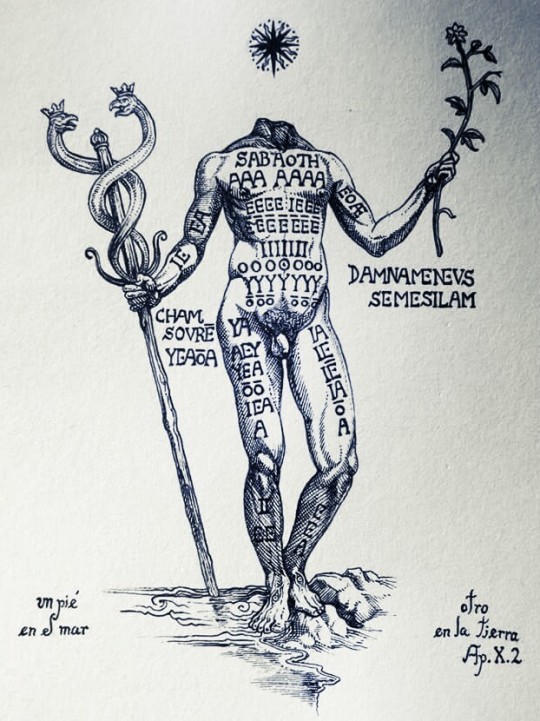
This post was inspired by @ditchdwellersupreme in a discord server that made me think deeply and sent me down a rabbit hole about how valid is the approach in this sense.
https://hareesh.org/blog/2016/2/5/the-real-story-on-the-chakras
Christopher Wallis, a Sanskrit scholar and practitioner goes in depth about them but the points he talks about in that specific blog is that:
There's not just one chakra system in the original tradition, there are many.
The chakra systems are prescriptive, not descriptive.
The psychological states associated with the chakras are completely modern and Western.
The seven-chakra system popular today derives not from an ancient scripture, but from a treatise written in 1577.
The main purpose of a chakra system is to function as a template for nyāsa — installation of mantras and deities.
The seed-mantras that you think go with the chakras actually go with the elements that happen to be installed in those chakras.
I am not here to argue on the validity of the practice of 7 chakras but on the practicalities of the practice itself, how it affect western practices and methodology and if they do have a place in western magical traditions?
hmm...if you imagine that the chakras are prescriptive and that they install mantras and deities into our bodies...then what about Phylacteries and talismans. What about physical body and letters in regard to that?
Chaim Vital wrote: 'Know that in each and every organ of a person's body, there are letters engraved, informing us about that individual's actions. But the primary place is the forehead, as indicated earlier.'
Some people might think of Jewish practices as not Western in nature and that's valid, but the Testament of Solomon also shed light on this when it associate a body part to a demon/angel combo. a fragment of Celsus from Origen says:
… the Egyptians say that the body of man has been put under the charge of thirty six daimons, or ethereal gods of some sort, who divide it between them, that being the number of parts into which it is divided (although some say far more). Each daimon is in charge of a different part.
you can find a decan master list here , the sacred book of ascelpius talks about it from an astrological point of view:
Aries is the head of the world, Taurus the neck, Gemini shoulders, Cancer breast, Lion the back, shoulder blades, heart and ribs, the Virgin the belly, Libra buttocks, Scorpio the pubis, Sagittarius the thighs, Capricorn the knees, Aquarius the legs and Pisces the feet.
All of these could be seen as a way of diagnosing and medical magic, but also they have their own significance in this practice. I don't say to mish-mash the systems together but maybe there's more to it than what we think is not.
Arab magicians write talisman for dream and tie it to their right upper arm, why the right upper arm and not the left? phylactery like the one used in the headless one is tied on the forehead...is there something more to it? I am not saying take all the chakras willy nilly, just that there's something to it. Heart, Stomach/lower belly, and top of the head.
Clearly I am taking the side of "yeah bro use dem chakranaynays" and honestly, my own practice didn't take off until I used a specific practice that dealt with dream incubation through visualizing the planetary symbols on the medulla oblongata following the Chaldean order with each symbol lasting a week.
Does that mean I encourage reckless experimenting with them? of course not, they hurt and you would hurt yourself if you push yourself too hard with them. You use them as a part of a whole system, maybe you just use pillar and spheres to energize yourself or visualize the nadi/channel during nine bottle pranayama.
The usual recommendation is to follow eastern procedure and it might feel weird for some people, it's honestly better to take a step back and see your own practice. The spirits would work with/without it, but your body is still gonna respond to spirits on some physiological level. Pragmatically speaking some spirits might even be more willing and might perform Nyasa for you. If you think about it, invocation and god-forms melt togethers and the product of these come closer to something resembling a similar practice.
I am not saying to dilute/innovate on your first try! that's one thing I want to emphasize. I am just saying that incorporating some simple practices can allow more avenue for the spirit to contact you.
Of course I am not saying..oh install demons on your head or do something reckless like that lol. To cap it off, Think of a deity you have a connection to, ask them which part of the body they relate to and ask them to inhabit that part, see what comes out of it. What if their image was on top of your head, in your heart, or in your belly, how would feel? Again this is all to be done with the deity approval or if they see the practice fit for you.
"The wrong person even with the right knowledge will come to no good end. But the right person even with the wrong (or incomplete) knowledge will make it work."
Sources:
JSK's Testament of St Cyprian
Jacobus G. Swart's Self Creation Blog.
Lastly a meme that I thought was funny about this.

#occult#ritual#magic#magick#witchblr#spirit work#spirit#chakra#mantra#invocation#western magical tradition
47 notes
·
View notes
Text

"Raise your hands, you can touch the sky"
I rewatched Lolirock lately, so fanart time.
Not happy about Talia's skintone, but metallic pencils are a bit capricious in that regard
DeviantArt
#Lolirock#Lolirock fanart#Lolirock Iris#Lolirock Talia#Lolirock Auriana#magical girls#magical girls fanart#western magical girls#traditional art#metallic colored pencils#colored pencils drawing#French cartoon#my fanart#shit by me
18 notes
·
View notes
Text
#Polls#I have been pondering cultural alienation as it relates to access to gender roles#And also traditions that come with duties#I.e. do cultures that push no premarital sex pair that with a duty to then support people to find Good [religion] partners#To just make it work#And then westernized assimilation comes along#And maybe you retain the value but not the duty#So kids are left to just magically produce a DoctorLawyerAccountant partner the day they turn 23#Regardless of being in a culture that sex segregates and you aren't allowed to fraternize w the other gender#But you're Western Now so parents don't help you navigate#Idk#I ponder#My posts#Hopefully this makes sense#I briefly tried to find one of those blogs specificly for polls but gave up
14 notes
·
View notes
Text

Fulani braids are such a beautiful hairstyle, with so many unique ways to wear it💜
🪙🐚🪙
#history#fulani braids#african culture#hairstyle#black hair#tribal braids#african history#traditional practices#black girl magic#girly things#natural hair#western africa#traditional femininity#black hairstyles#womens history#africa#black women#sahara desert#femininity#womens history month#soft girl#african women#black femininity#beautiful#braids#nickys facts
115 notes
·
View notes
Text
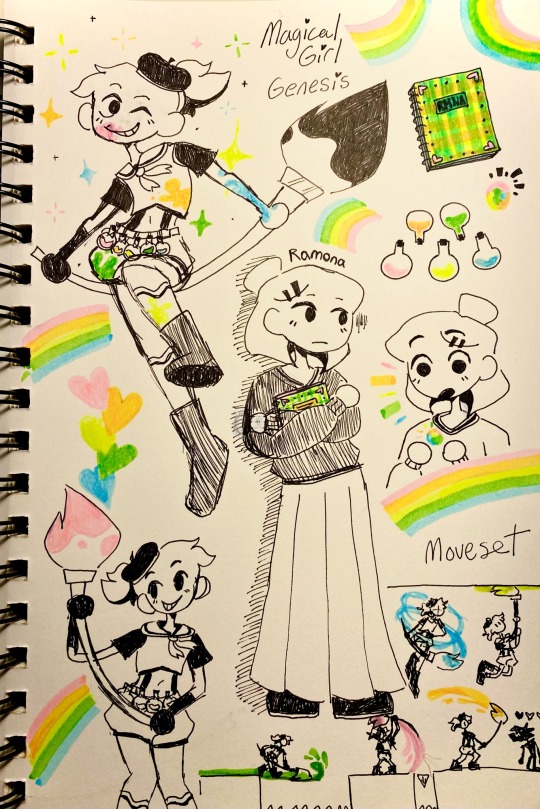
Introducing Ramona Lee, aka Magical Girl Genesis!
As the Rainbow Guardian, Ramona is able to transform into the girl she’s always wanted to be, while fighting the black ink monsters that haunt her school. They’re goal is to stamp out the world’s creative expression, and Genesis can’t let that happen.
Her life isn’t all fighting — not in the literal sense, at least — as she faces the wonderful world of high school. Surely with magical powers, she is invincible to the problems of the real world… right?
~
This is a character and game concept I came up with on a whim last night, and I already love her. I imagine this game would play and feel like a combination of Splatoon, Persona, and Cuphead (two of which are games I’ve never actually played, but ignore that).
I hope you enjoy her concept as much as I do!
#oc art#oc#original character#character concept#concept art#art#sketchbook#sketchbook art#traditional art#romani representation#queer characters#queer oc#romani oc#poc oc#magical girl oc#game concept art#game concept#magical girl#mahou shoujo#western magical girls#rainbow#queer#oc sketch#rainbow oc
35 notes
·
View notes
Text
I think a big problem in our culture is equating intent and effect, and this works both when predicting the effect and when determining the cause. It is important to remember that just as having good intentions does not excuse the harm one causes, so does someone having caused harm not always mean they intended to cause harm all along.
We are able to know our own thoughts, so when we cause harm we may easily downplay it because "that's not what I intended", as if that would make the harm go away. And when we judge others who cause harm, we similarly try to work backwards from the assumption that harm requires intent - and since we see the harm but not the intent, we assign intent somewhere where it may not even exist.
None of this is to excuse people who cause harm, but maybe to clarify that what we call evil is not some nefarious satanic mindset of ill intent, but rather a stubborn unwillingness to critically examine whether you might be causing harm even if you don't actively intend to, and even whether or not you truly care.
And the more power you have, the easier it is to distance yourself from the harm you cause and keep causing it.
#philosophy#evil#intent is not magic#on an unrelated note i do think this also stems from some form of christian tradition#as 'god created the heaven and the earth' forms this assumption that nothing would exist without an active will to make it exist#the anthropomorphic god who created humans in their own image is in a way linked this erroneous thought pattern#that reality is caused by intent#which is why the problem of evil exists#since the idea is that if god willed the world into existence and there is evil in the world surely god intended to put it there#but like#not to get all atheist in a post about philosophy but wouldn't it help us all to rid ourselves of these kind of mind traps#and yeah yeah my background is christianity and christianity is a major religion affecting western culture so#if you want to challenge me based on 'not all religions are like that' or whatever i don't care that's not the point#the point is the post itself the tags are for weird off-tangent speculations about where this mindset may come from#the actual point is about trying to disconnect intent from harm since those are not the same as cause and effect#intent doesn't prevent harm and harm doesn't require intent#anyway that was my random philosophical thought of the day#thanks for reading
12 notes
·
View notes
Photo
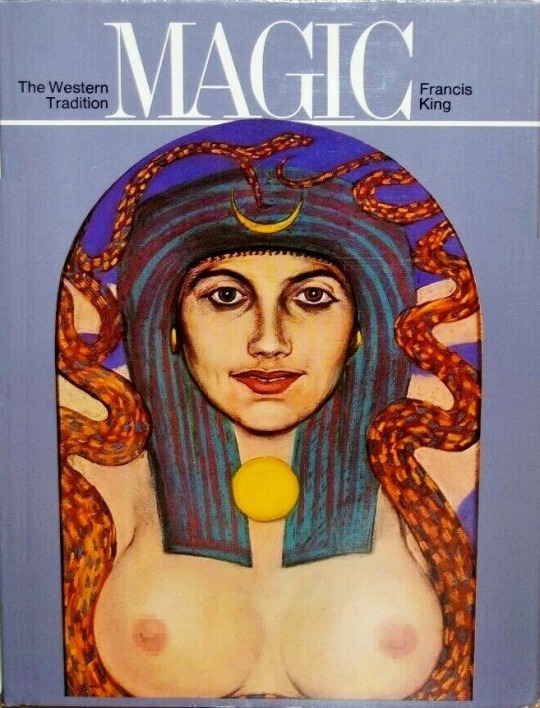
Francis King - Magic: The Western Tradition - Book Club Associates - 1975 (on the jacket: Isis Unveiled, pastel by Austin Spare, 1954)
#witches#magic#occult#vintage#francis king#austin osman spare#the western tradition#book club associates#1975#isis unveiled#austin spare#1954
72 notes
·
View notes
Text
Karin Valis on Magic and Artificial Intelligence – The Secret History of Western Esotericism Podcast (SHWEP)
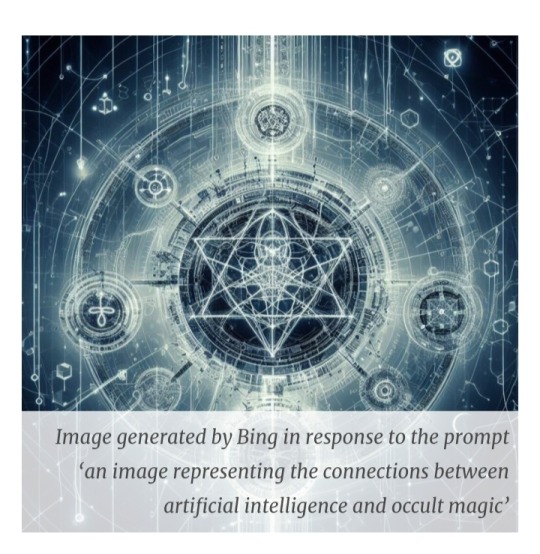
A House with Many Rooms Interview 2
We are delighted to speak with Karin Valis, machine-learning engineer and esoteric explorer, on the vast subject of how the fields of artificial intelligence and magic overlap, intertwine, and inform each other. We discuss:
The uncanny oracular effects and synchronistic weirdnesses exhibited by large language models,
Conversations with ChatGPT considered as invocation,
AI as the fulfilment of the dream of the homonculus (with the attendant ethical problems which arise),
AI as the fulfilment of esoteric alphanumeric cosmologies (and maybe, like the Sepher Yetsirah, this isn’t so esoteric after all; maybe it’s just science),
And much more.
Interview Bio:
Karin Valis is a Berlin-based machine learning engineer and writer with a deep passion for everything occult and weird. Her work focuses mainly on combining technology with the esoteric, with projects such as Tarot of the Latent Spaces (visual extraction of the Major Arcana Archetypes) and Cellulare (a tool for exploring digital non-ordinary reality for the Foundation for Shamanic Studies Europe). She co-hosted workshops, talks and panel discussions such as Arana in the Feed (Uroboros 2021), Language in the Age of AI: Deciphering Voynich Manuscript (Trans-States 2022) and Remembering Our Future: Shamanism, Oracles and AI (NYU Shanghai 2022). She writes Mercurial Minutes and hosts monthly meetings of the occult and technology enthusiasts Gnostic Technology.
Works Cited in this Episode (roughly in the order cited):
The homonculus passage in the Pseudo-Clementines: Homilies 3.26; cf. Recognitions 2.9, 10, 13–15; 3.47.
On the Book of the Cow/Liber vaccæ: see e.g. Liana Saif. The Cows and the Bees: Arabic Sources and Parallels for Pseudo- Plato’s Liber Vaccæ (Kitab al-Nawams). Journal of the Warburg and Courtauld Institutes, LXXIX:147, 2016.
‘The Measure of a Man’, Star Trek: The Next Generation Season 2, Episode 9, first aired 13 February, 1989.
Doctor Strange, dir. Scott Derrickson, 2016 Marvel Studios.
Recommended Reading:
Karin has a substack where she posts interesting things. Her recent essay Divine Embeddings is particularly relevant to the discussion of alphanumericism in the interview.
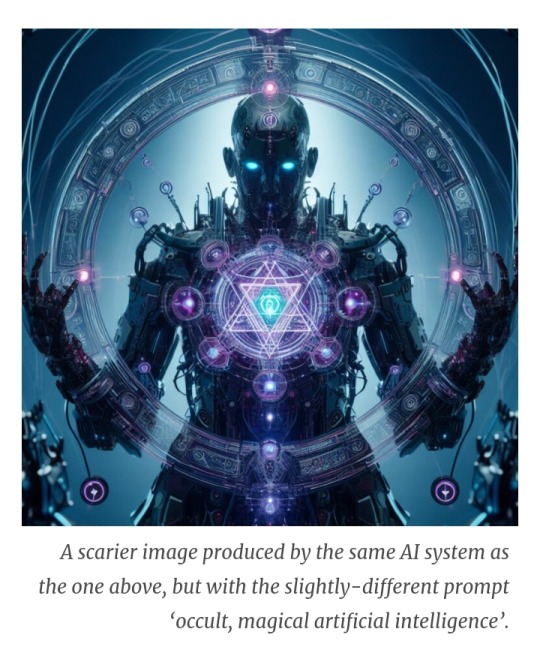
#history of science#ai#artificial intelligence#ai art#philosophy of science#history#media theory#magic#history of mathematics#history of computing#history of religion#the digital age#alchemy#kabbalism#golem#homunculi#homuncus fallacy#western esoteric tradition#marx and computing#marx and mysticism#the digital#shwep#the critical tradition
2 notes
·
View notes
Text
youtube
Chuja's World | The Father of Modern Occultism: Eliphas Levi
#western occultism#western hermeticism#western esotericism#western esoteric tradition#ceremonial magic#alchemy#occult#magick#magic#hermeticism#freemasonry#eliphas levi
5 notes
·
View notes
Text
anyways shinbyeong, at least thats the title im going with unless i come up with something more cool
the setting is korea in the early 1930s (so during the japanese occupation of the peninsula), where theres a single mother and her 18 year old child who refuses to get married are trying their best to get by
but then a fateful encounter with a mysterious shaman occurs causing both the mother and the child to be possessed/linked to a nature spirit, now they have to find that mysterious shaman and break their connections to the spirit with the help of other shamans in similar predicaments, all while avoiding being captured by the government, as you do
#wish i had names for the mom and her kid but since theyre both korean and japanese#during a time when the government mandated that korean people couldnt have japanese names makes this a bit difficult#but yeah the magic system is essentially like irl korean shamanism but with my own spin on it#shinbyeong is an actual phenomenon irl people can experience where they get sick or weak with no explainable reason why#and shamans have noted that this predicts who has been chosen to be a shaman by the spirits or gods#but im pretty sure irl shamans cant manipulate the elements lol#this story is meant to be about self acceptance and reconnecting with your culture when youve been denied it due to external factors#felt placing this in the 1930s when japan was really controlling of korean culture was a really good fit#focusing on shamanism was also deliberate since it is an indigenous religion to koreans thats been constantly been pushed away#in favor of buddhism or shintoism or whatever#and the fact that the rapid westernization of korea began around this point also serves to show that disconnect from tradition#idk its been pretty fun thinking about this stuff even if there is obviously a lot of heavy topics like war crimes and brutality#some of which will be covered in shinbyeong#now i do plan on working on this on and off since i do have the kny rewrite to complete#but its on my to do list :)#shinbyeong
4 notes
·
View notes
Text
Sometimes I'm on here and y'all make posts that just make me go, "you are very young and would benefit from learning something about our culture in the last hundred years".
Yes, people are upset by trans and enby people, because their lives are entirely structured around the different roles of men and women, and the idea that men and women are fundamentally different and inherently suited to their traditional roles. Like, that shouldn't be a big realization. That was a major part of western culture until quite recently, and still is for a great many people. We attack their basic worldview by existing as ourselves. Obviously they're wrong, but that doesn't change the emotion of the situation.
Yes, conservative cis people act like marriage is a chore. For most of history, and certainly US colonial history, marriage was a social and economic necessity that created a working partnership. Attraction was certainly a hoped-for element but not strictly required, and love was a bonus, possibly even a bit suspect as a motivation. It was still like this when my grandparents married. I know couples today who are separated but married for financial reasons. We're not talking about the distant past. Marriage has been many things through the years, and "an equal partnership based on love" is a very recent iteration. Of course our culture is littered with artifacts of the older way. The older way was like...yesterday. Today.
Yes, Grandma has trouble at the grocery store checkout. When she was a kid they had rotary phones and radios, and you paid for everything with cash. She grew up in a culture that taught that childhood was for learning and adulthood was for doing, and now the world is asking her to learn a bunch of new things that basically sound like magic, and she's not even sure she can, and she's not at all sure it's an improvement (and she's got a point, though she might not know it).
There's just....a real lack of perspective. I dunno, watch some documentaries about the fifties. Read some historical novels. Go to the local Victorian house tour.
5K notes
·
View notes
Text
"The McCarthy Shill", Egregores, and the influence of different magical schools into the thinking

This blog post was in regard to one of my friend's comment and him feeling pessimistic about it, he told me how "gods sucks, kabbalah is elitist. Don't matter how much I practice, someone gonna get the dream initiation cause they just meant for it. McCarthy shill is actually legit" I hope that this preceding quotation clears up the topic of why I am talking here or why I feel the need for talking about this considering that my friend is reading Quaeria's book right now.
I am someone who personally have his own reservations about the author and magic teacher Josephine McCarthy alongside her course Quareia. I am afraid the adage that says If you're not paying for the product, then you're the product , that's the case with Quaeria's course. I don't like beating around the bush but something to say from Jean Dubuis's essay "Group trips or Solo traveler" if we work in a group, or under the direction of a pseudo "master" or "guru" or through some mediumship we will only perceive the Astral. I hope that at least this clears up some concepts here.
I personally recommend the work of Mouni Sadhu, G.O Mebes. Valentine Tomberg, and the french-russian tarot/occult school with their in-depth explanation of egregores and tarot concepts, Stavish in his book egregores talks about it passingly from the french russian school view, worth a read if you don't want to go down that rabbit hole.
That's done...Back to the "McCarthy's Shill" a lot of stuff feels very general and "modular" and "not attached to any school". I mean that's what Quareia is about no? in Module 2, Lesson 1 you say
I (say your name), as an apprentice of the Quareia, ask that I begin
the journey of the cup.”
Why do you have to say that out loud?
and she have weird stuff to say about getting practical results:
If you try to dodge that growth process through results magic, you
will not only end up magically weak and ineffective, but you will also start to slide down the long slope of degeneracy as a magician. For example, I have been in magic for nearly forty years, and I have connections with magicians all over the world. I have yet to meet a long-term results magician who is not broke, lonely, sick, depressed and screwed up. They all do well for a small number of years… and then the backlash comes home to roost.
What about her own vision of Pentagram Ritual as she calls it(LBRP spin off) ?
Get out your notes from your astrology lesson and your work with the
chart and the pentagram. Look up your planets again in relation to you standing in the centre of the chart/pentagram. Focus on the positions of Saturn and Pluto.
The full ritual is in module 2, lesson 3. Suffice to say, WHY WOULD YOU WORK WITH SATURN AND PLUTO in your pentagram ritual. It just sounds insane and don't get me started with her Arbatel or PGM takes. What do you get in the last lesson of Apprentice's lesson?
Remember, from now on, for the rest of your life, you have agreed to be judged in this life and to walk the path of the Mysteries.
She says it's not an oath, but...isn't it an oath since you said "I Agree" to the angel in the vision of the 81st lesson? One last thing to consider is that.. in one of her podcast she mentions that the magician is on the altar of greater force.
ENOUGH McCarthy lol! that's the general message here, yes she have inner contacts but the forces she's in contact with might not be very suitable with everyone. I will ask you, do you want to learn your own life lessons or do you want her life lessons? A misconception some people have is that they have to force themselves to go through certain experiences to validate their beliefs that they're going on the right track. You don't need me, McCarthy, or anyone else to tell you that! You have your own life lessons, Josephine have some good stuff here and there, her technique works but clearly there's an agenda going on. Maybe not her..but something behind her pushing these ideals or thoughts. Visionary magic, it works but are you sure you want to get into contact with the "forces" that she got into contact with?
I ended up making 60% or maybe 70% about bashing Quaeria and the course, but let's focus on something more important here. The author you read ,the books, the courses, the spirits, the land, etc all of that gathers up and add up. Take a step back and see how they affect you and how they affect the way you think about stuff.
Really just look at each school, tradition, or even methods. Take a step back and think about the methods being pushed here and there, they all have their own preconceptions and ideas that are forced upon us willingly and unwillingly. What started in my thought of this blog to not give up on this or that, became more of an introspective of are you taking the right steps? are you doing the right thing? for who? for you.
It is sometime comforting to just take people's insight, or take their views on stuff and work with them temporarily. Sometime people are overly skeptical of stuff and act like know-it-all and sometime people are too trusting of the authors or people who wrote stuff. I will borrow the word of someone( @HieraTechne ) in the hermetic house who said
a) Persevere, persist.
b) It won't be pleasant, you will feel alone in the silence, but persevere, persist.
c) It can help to treat your path as a Leap of Faith. Imagine yourself blindfolding your self, and making a step into the unknown. if you can't reward yourself with the content of the contact, reward yourself with your faith, your determination, your persisting.
d) Stuff will happen beside seeing or hearing.
e) You not seeing or hearing them doesn't mean they not hearing or seeing you.
f) Do not be jealous of other people amazing or, from your perspective, even otherworldly experience. It will happen. Forgive yourself and go on.
g) You will still have amazing experiences, just of a different grade. Learn to love what you have, and get the best out of it.
And that's 100% true, you don't need to have my experience or someone else who's naturally psychic's experience. I personally knew the difficult of spirit vision and visualization when I first started and couldn't wrap my head around it, just do the other stuff like petition, prayers, talismans, work in nature, work at home, invocations, etc.
So it is with taking all of that consideration, don't give up. If it is a dream initiation you want, then dream incubation you must. If you keep going, praying, doing rituals, and all of that, it is heard. Keep going and it will be answered, just like R.O's Seven Sphere or Stavish's dream incubation through elements and planets. I ask that you pray to the planets, to gods, to the land, pray to them and for them. Pray to the divine, pray to the earth, just keep praying and applying yourself to the craft and you will make it.
If anything, just like the sun goes down at night and die. So your aspiration shall be reborn like a blazing, strong, and powerful ray of solar flare in the morning.
I believe in you, friend(s) <3 with all the efforts you put in I believe you will be rewarded. I hope my ramblings was helpful for someone who feel defeated or hopeless in regard to practice.
youtube
#occult#magic#witchblr#magick#ceremonial magic#western magical tradition#egregore#thoughtforms#thoughts
12 notes
·
View notes
Text
If you’ve tried to study alchemy, you’ve probably come across the name “Hermes Trismegistus.” Hermes the Thrice-Great is often referred to as the mythical sage who invented everything from alchemy to mathematics to Judaism. There is no evidence he ever existed, but the legend of Hermes Trismegistus is the mortar holding together the bricks of western alchemy.
As you read the rest of this book, Hermeticism will come up a lot. Occultists love Hermeticism because it is a powerful tool for syncretizing disparate spiritual traditions. In short, it is religious duct tape.
First, it gave us a legendary sage that supposedly all knowledge came from. A common problem with religions is that they disagree. Hermeticism says that if two theologies have a similar idea, that’s because they both came from Trismegistus. Additionally, the history of alchemy and magic is complicated. By saying “it all comes from Trismegistus” you save quite a bit of time. Because of this, Hermeticism serves as a scaffolding for the otherwise chaotic history of western esoterica.
Talking about Hermetica today on patreon!
1K notes
·
View notes
Text
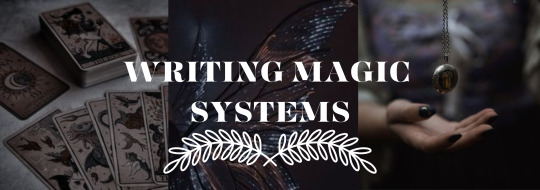
Let's Talk About Magic Systems.
There are two broad ways you can establish magic in your story world - work with existing concepts, or adapting it for something new.
Pick a System
High Magic vs. Low Magic
This distinction existes mostly in the western wrld from the Middle Ages onwards. In non-western cultures, this distinct often doesn't exist.
High magic requires magicians to study from books, ingredients are expensive and instruments elaborate and hard to get. The typical practioner of High Magic is of the upper class, highly educated, and rich. They serve in King's courts and have high social standing thanks to their knowledge.
Among the lower classes and women, Low Magic is ore common. It is taught orally and doesn't require reading skills and uses everyday objects and ingredients.
Black vs. White Magic
"White" magic is often associated with good, and "Black" with the evil. However, what really matters is the magicians intension, not the magic system that they work with.
The term "black magic" is often associated with working with the dead. It can also be used by an individual/group who just wants to appear more menacing.
Ceremonial Magic
This kind of magic involves lots of ritual, recitation and prayer, often in ancient langauges such as Latin, Aramaic and Sanskrit.
Most of the time, it's High Magic and practiced by religious figures.
The typical practioner is educated, has great confidence and a good memory.
Natural Magic
It involves ingredients from nature, such as herbs and water.
It may be practiced outdoor, in a kitchen, or in a laboratory.
The rituals are simple and short, and the practioner will watch out for the turning of seasons, phases of the moon, etc.
Religious Magic
This is a diety working through a magician. The magician prays and asks her god to work the miracle.
Most religions have their own form of magic, and the kind of miracles that the magicians can bring can be limited.
Wiccan Witchcraft and Voodoo are largely religious magic.
The typical practioner would be spiritual and devout, often suspicious of other religions.
Alchemy
Alchemy is both High and Low Magic, and it can incorporate religious, spiritual, philosophical and mythological elements.
In a modern setting, alchemy can also be portrayed as "science gone too far".
The typical practioner would be patient, methodious, educated and driven. The tools includes laboratory equipment, astronomical charts, writing materials, and an unsuspecting roommate(?) for testing.
Traditional Witchcraft
Traditional Witchcraft is a form of Low Magic. In early historic periods, the witch played an important role in village life, often old women who owned apothecaries and helped out other villagers.
The typical practioner would be female, uneducated, illiterate, practical, resourceful and poor. She will have a good memory and well-developed senses.
Tools used would be simple household implements - a cauldron, a broom, knife, etc. that can evade the Inquisitor's suspicions.
Wiccan Witchcraft
If you write contemporary fiction, this is the system your character is most likely to use. It's modern witchcraft, based on the religion of Wicca.
Wiccan witchcraft mostly developed in the second half of the twentieth centruy. It is a form of bothe Natural Magic and Religious Magic.
Based on nature worship and the polarity between male and female, the magician often begins a Wiccan ritual with an invocation to a God/Godess. The Lady (Godess) is depicted as having three aspects: Maiden, Mother and Brone. The Lord (God) may be depicted with horns.
The focus of Wiccan magic is often on healing, with an emphasis of ethical consequences of what is being performed.
It is often practiced outdoors, sometimes naked (which they call 'skyclad'). Wiccan witchcraft uses the phases of the moon to amplify its effects.
Wiccan like to gather in groups called 'covens' or to meet once a month or for major festivals. The coven leader may be called 'high piestess/priest'.
Typical tools include a chalice, a knife (called 'athame'), a wand, candles, herbs, crystals, and essential oils.
Necromancy
The magician summons a dead person, either ghost or spirit, sometimes bodily. The dead are enlisted to grant the magicians with favors or are questioned for information.
It may be related to Shamanism, as well as to some forms of psychic work such as channelling and Spiritualist seances.
The typical practitioner is psychally gisted, strong-willed and courageous.
Shamnism
Shamnism is a Low Magic system. The shaman intercedes between the human and spirit world by communicating with spirits, often to obtain information or provide healing.
Shamans may travel to the spirit world to seek answered, with some level of danger. They use drums, chanting, dancing and drugs to alter their consciousness and communicate with spirits.
Practicing shamans often work alone, but they choose a successor to train. The apprentice is supposed to accept the calling.
The typical shaman is musical, sensitive with a strong sense of rhythm and the psychic.
Tools include drums, bells, a costume, herbs, bones, smoke and mind-altering drugs.
Ancient Egyptian Magic
Ancient Eyptian Magic ovelaps with Religious magic, medicine and with psychic work. The deities most frequently evoked are Selket, Aset for raising the dead, and the gof Thoth for anything to do with sickness and healing.
The emphasis of Ancient Egyptian Magic is protection, often done throgugh an amulet or talisman. The circle or oval is the most important shape that has protective qualities.
The precise wording of a spell is important, as well as the colors that are involved. For magic to affect someone the magicians must know that person's true name.
The typical practitioner is male, literate, often a priest attached to a emple.
Folk Magic
This is a form of Low Magic practiced by amateurs.
This includes housekeepers who can keep the rats out, farmers who can ripen fruit before the height of the season, and scullions who can make water boil faster.
This people would only know a handful of spells, ans pass them in to memebers of their family.
Voodoo
Voodoo is religious magic and low magic.
The rituals are held in private, and may involve communication with spirits, especially the spirits of ancestors and saints.
Commonly used to cure aliments, confound enemies, and obtain desires.
Invent a System
Choosing the Right Words
If your character is clearly a witch, shaman, a necromancer, etc. with a specialty, use that term. Otherwise, the word "magician", or "mage" would be most appropriate.
The term "magus" (plural magi) refers to practitioners of the ancient Zoroastrian faith.
Strictly speaking, witches and wizards are practitioners of two very different magic systems, so your female character can be a wizard, and vice versa.
'Warlock' really means 'oath-breaker' or 'traitor' and doesn't describe a magician.
'Conjurer' is someone who can creae effects to impress an audience, not really magical in itself. The more modern temr would be 'illusionist'
A group of magicians may be called a 'coven' (though it applies mostly to Wiccan magic). A magician working alone would be a 'solitary'.
Magic vs. Magick
Normally, "magic" is the correct spelling.
However, "magick" may be used, especially by insiders, to emphasize that they refer to the real thing, not conjuring or other trick of the eye.
The magic systems are sometimes capitalized, sometimes not. When it involves a religion, nationaliy, or a particular family line, it is capitalized. Just make sure to keep it consistent throughout your book.
If you like my blog, buy me a coffee☕ and find me on instagram! 📸
#writer#writers#creative writing#writing#writing community#writers of tumblr#creative writers#writing inspiration#writeblr#writing tips#writers corner#writers community#poets and writers#writing advice#writing resources#writers on tumblr#writers and poets#helping writers#writing help#writing tips and tricks#how to write#writing life#let's write#resources for writers#references for writers
497 notes
·
View notes
Text

Beng tribe’s unique form of birth control!🩸
🌱🩸🥘
#history#beng tribe#menstruation#cote d'ivoire#pre colonial#african history#people who menstruate#fertility#black girl magic#periods#traditional practices#beng history#girl positivity#western africa#just girly things#pre colonial africa#period problems#black femininity#traditional femininity#birth control#menstruation history#african culture#historical practices#nickys facts
6 notes
·
View notes
Text
In spite of the class’s vaguely Christian trappings, the Dungeons & Dragons cleric is not particularly anachronistic in this respect; throughout the history of Western Europe, most magical practitioners were also devout Christians, and indeed, any given community’s foremost practitioner of traditional folk magic was likely to be the village priest.
They were not, of course, supposed to be doing this, and they’d get yelled at by their superiors in the Church whenever they were caught doing it, but typically no harsher measures would be taken, because literate people were hard to replace. For their part, such priests tended to regard their practice of magic as wholly compatible with the Christian faith, and generally viewed the admonitions of their superiors as the grumbling of out-of-touch hierarchs who didn’t understand the situation on the ground.
I bring this up not because D&D characters are obliged to be in any way historically accurate, of course, but because it highlights a rarely taken and very entertaining approach to characterising your cleric. Folks tend to gravitate to playing clerics as either stick-in-the-mud doctrinaires or edgy mavericks; the third option, as suggested by the above, is to play your cleric as perfectly secure in their faith in a way that happens to be moderately heretical, responding to the corrections of their superiors by going “sure thing, boss”, then proceeding to ignore them completely as soon as they’re out of earshot.
#gaming#tabletop roleplaying#tabletop rpgs#dungeons & dragons#d&d#history#religion#christianity#character design
5K notes
·
View notes